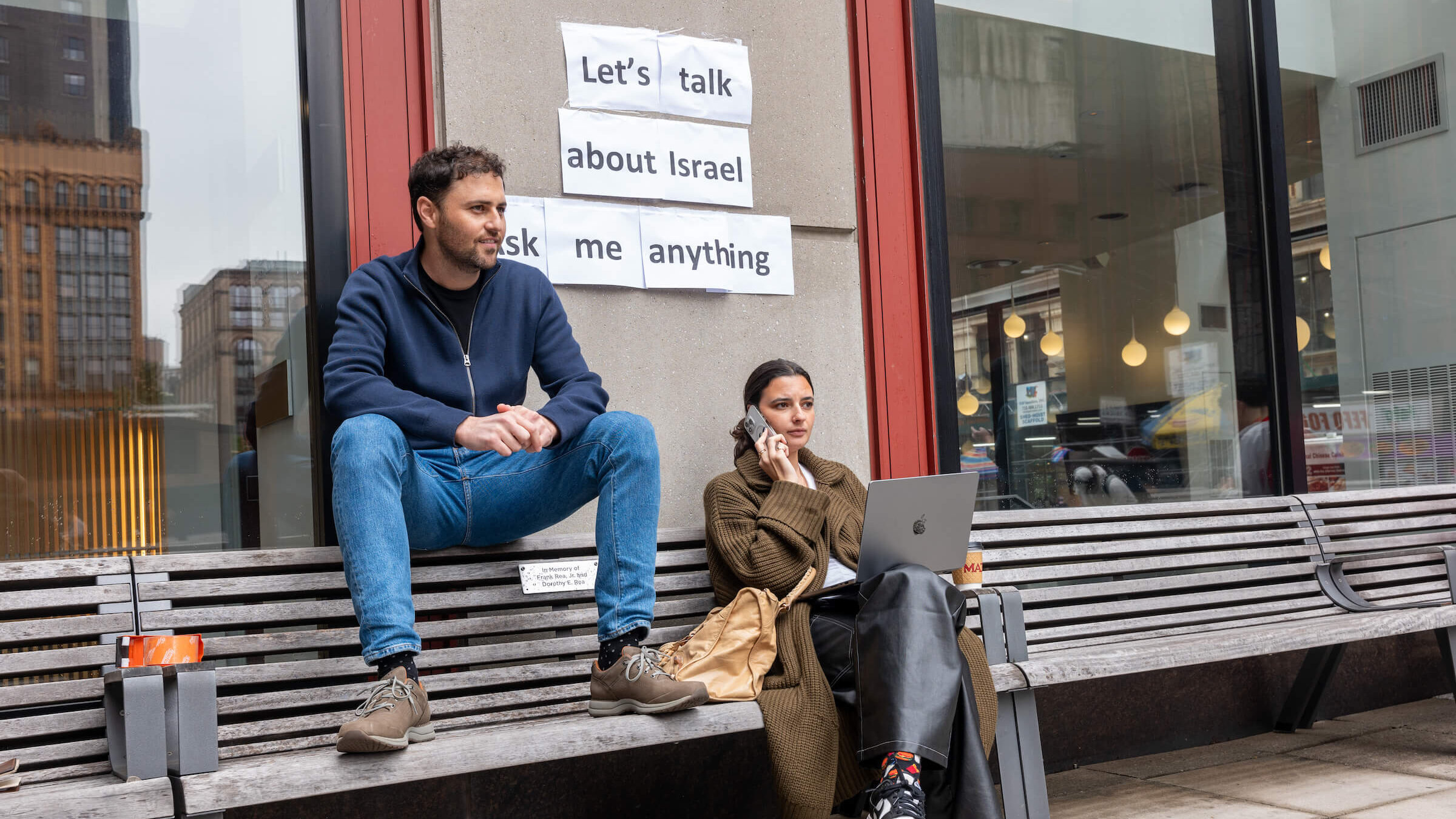The Israeli-Palestinian discourse on campus is even more terrifying than the Hamas attack
Fundamentalism has taken over the humanities. Curiosity has been replaced by closed-mindedness; creativity stifled by uniformity

Students from Israel at New York University offer to speak with classmates about their home country as tensions between supporters of Israelis and Palestinians increase on college campuses across the nation. Photo by Spencer Platt/Getty Images
For Israeli Jews like me, Oct. 7 was the worst day since the Holocaust. For Americans like me, the days after are even more terrifying.
Professors and students at major research universities and small liberal arts colleges alike celebrate atrocities we thought would never again be repeated. Now they have been perpetuated, recorded, heralded and, often in the same breath, denied.
The academy, particularly the humanities, once provided a firewall against religious and political fundamentalism. But the woke enlightenment on campuses has turned English departments into activist dens of political orthodoxy, a regression into fundamentalism.
Puritanism has always gripped the right in the United States, but messianic piety has now taken over the left. And it happened long before Oct. 7, especially in the humanities. Coercive orthodoxy reigns where jobs, promotion, and tenure depend on keeping the party line. Curiosity has been replaced by closed-mindedness; creativity stifled by uniformity.
I got my doctorate in English at Columbia University in the 1980s. I have since lived in Haredi neighborhoods in Jerusalem. Today, I see the true fundamentalists are the leftists who glorify Islamic martyrdom; who make shrines to Hamas murderers; who barricade and threaten Jewish students at Cooper Union.
This has not come out of nowhere. Anti-Zionism has always been the tell for the woke left. Don’t bother trying to qualify for woke credentials unless you are a fervent believer in Palestine. I see it firsthand as an English professor based in Israel.
Literary critics are supposed to be suspicious of stories that oversimplify, but with the Israeli-Palestinian conflict, the one and only acceptable storyline has become like a children’s allegory: The Palestinians are good, the Zionist Jews, evil. People who are open to pluralism and different perspectives in every other context approach the Israeli-Palestinian conflict as a medieval morality play, with the Jews cast as modern Christ killers.
The intersectional alliance — like its Puritan predecessors — offers salvation, just not for the Jew. Israeli-Palestinian issues are not incidental to the intersectional identity but defining of it. The leaders of the Dyke March in Chicago in 2017 turned away the Jewish (Zionist) lesbians who superimposed a Star of David on a rainbow flag. The organizers of the Philadelphia food festival told a food truck selling falafel to leave the premises.
Among all the different faiths, gender orientations and political positions, only the Zionist — and perhaps the fascist — is excluded. All other beliefs seem to be up for grabs, but Zionism is the agreed-upon anchor, the metaphysical evil, giving stability to the woke moral universe.
The long-seething bloodlust against Jews has shown itself in Hamas atrocities, as well as in the progressive apologetics for them, as darkness, as John Milton puts it, visible. Sadly, and terrifyingly, this October revolution on American university campuses turns out to be waged against the Jews — even those Jews on the left who are suddenly discovering the war is against them.
Over the millennia, the very existence of the Jew has been a reminder to those who pursue the absolute truth of political and religious movements that their truths are incomplete. We prove the lie of all fundamentalisms — first to early Christianity, now to the woke. Jews have always known and suffered the dangers of coercive orthodoxies, even those — perhaps especially those — based upon love.
Today, however, the humanities have entered the dark ages of their own scholastic fundamentalism, an unforgiving orthodoxy that advertises belief in difference, but aims to annihilate its historical advocate, the Jew.
One professor at UC Davis told her Twitter followers that “zionist journalists” have “houses w addresses, kids in school,” adding “they can fear their bosses, but they should fear us more.” The post was punctuated by blood, ax, and knife emojis.
In the meantime, university presidents offer lame condemnations, and psychological services, instead of disciplining students and faculty who try to provoke pogroms.
After World War II, American Jews like M.H. Abrams, Lionel Trilling, Harold Bloom and Stanley Fish did not cancel Christian literature, but instead helped create the modern discipline of literary study.
They made the humanities the defining discipline of the liberal arts, which had once made the university a place for critical introspection, open discourse, tolerance and pluralism. But after Oct. 7, the humanities have moved into a Stalinist phase, with Jews the primary target and victim.
Some Jews on the far left who are now reading the writing on the wall are now homeless. For them and for the rest of us, looking for language, meaning and poetry after the October Revolution, the university is dead; we must look elsewhere.
Editor’s note: An earlier version of this article incorrectly stated that Jewish students at Carnegie Mellon University were forced to hide in underground tunnels. Jewish students at Cooper Union were threatened and barricaded inside the library.
















